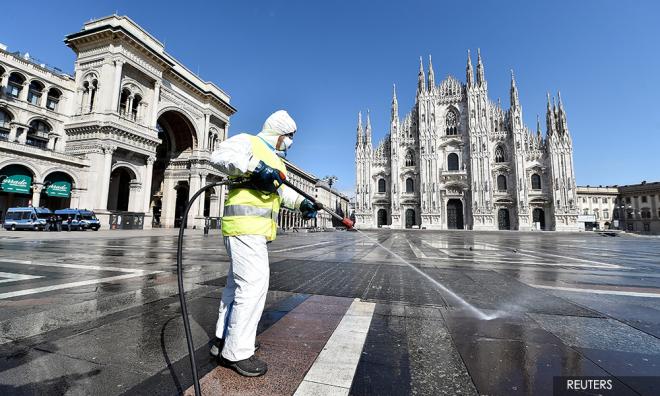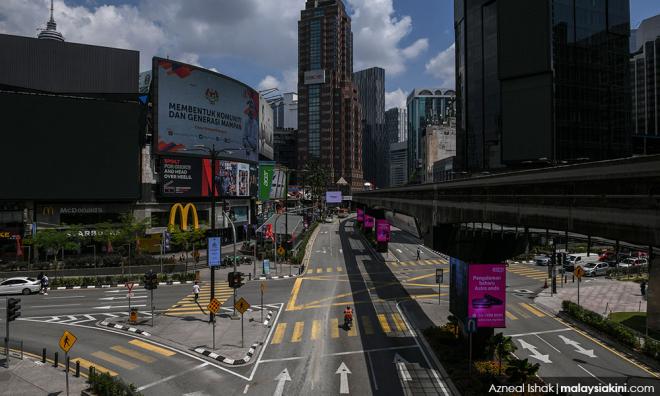
Published by Malay Mail & New Straits Times, image from Malay Mail.
As we head towards the end of the 3rd phase of the movement control order (MCO), the issue of striking the right balance between public health safety and economic survival becomes more acute.
As long as a vaccine is not yet ready, the possibility or high probability of a prolonged or extended MCO looms large in the government’s decision-making.
On April 23, scientists at Oxford University (collaboration between the Jenner Institute, Nuffield Department of Medicine and the Oxford Vaccine Group) started on its human trials. The goal is to produce at least a million doses by this September.
Adrian Hill of the Jenner Institute has been quoted as saying that the “vaccines are being designed from scratch and (progressing) at an unprecedented rate. The upcoming trial will be critical for assessing the feasibility of vaccination against Covid-19 and could lead to early deployment.”
Not to be left out, Cambridge University has also been working on a vaccine for some time now. Professor Jonathan Heeney, Head of the Laboratory of Viral Zoonotics at the University of Cambridge is one of the lead persons in the project researching on a suitable antibody — using new technology developed for influenza and Ebola viruses.
And our very own Dr Amalina Bakri announced in her Twitter account on April 22 that she has been invited to participate in the clinical trials for a Covid-19 vaccine at the National Institute of Health Research, Imperial College’s Clinical Research Facility (as reported in the Rakyat Post).
Nearer to home, it was also reported today that the Director General of the Ministry of Health (MOH) has also announced that we will be exploring collaboration with selected countries with the hope that vaccine development as well as clinical trials would be based here.
There are currently 150 vaccine development projects round the world racing against time. These include:
- India: Scientists under the Council of Scientific and Industrial Research (CSIR) are testing whether a multi-purpose vaccine that has proved effective against leprosy and boosts immunity in hosts can be a critical part of a Covid-19 vaccine development.
- US: The development of a vaccine has been taking place alongside the limited but controversial use of the anti-malarial drug, hydroxychloroquine. The National Institutes of Health in collaboration with Moderna Inc. as well as Inovio Pharmaceuticals are moving to the next stage of experimentation.
- Germany: The Paul-Ehrlich-Institut (PEI) of the Federal Institute for Vaccines and Biomedicines has authorised the country’s first human trials for a vaccine jointly-developed by German firm, Biontech, and US giant – Pfizer.
Nonetheless, as we are at this stage still not out of the woods yet, the policy dilemma of balancing between public health safety and economic concerns — with the former outweighing the latter – remains the bias in the matrix of configuring the decision-making process.
As it is, the decision as to whether to extend or not the MCO depends on the expert advice of the MOH. And the government is currently planning further for the gradual relaxation of restrictions in the context of both an extended MCO as well as the post-MCO phase.
In this regard, Prime Minister Muhyiddin Yassin when he announced the extension of the MCO for another two weeks till May12, also announced the relaxation of restrictions on travel for students and those trapped in their villages.
More than 100,000 students “trapped” in their schools and universities will be allowed to return home in their villages, along with those “trapped” at their villages when they were there just before the first MCO to return home so that they can report for work if their companies fall under the category of businesses allowed to operate under the MCO.
The SOPs for allowing these two groups to travel are being drawn now and will be announced in due course.
As such to repeat, at this stage in the development of a vaccine, public health consideration still overrides economic consideration.
Pending the outcome on the public health front vis-à-vis a vaccine, the Covid-19 pandemic has severely impacted on the global economy.
Thus, the introduction of vaccine and/or effective medication into the equation will be a game changer to cushion the severe impact on the economy caused by the lockdown brought about by the Covid-19 pandemic.
Without vaccine and effective medication to fight the virus, things would not return to the normalcy that we are so used to all this while, since the only way this can be achieved is to ensure not only the lethal and unseen virus is defeated but also that it will never make a comeback once defeated.
When experts talk about a new normal in the future economic and social landscapes that we would see during the post Covid-19 pandemic, they are actually talking about the real possibility that the virus would always make a comeback after their initial defeat if social distancing measures and observing regularly personal hygiene, along with abandoning some traditional habits like shaking hands or getting into a warm embrace are thrown into the drain soon after the initial defeat.
That’s why one Harvard expert proposes an on and off social distancing measures be applied after winning the first battle against the virus. But really, the only way to defeat the virus for good is through vaccines or effective medication, which is still a very long way to go at this moment.
Which means countries the world over must make the adjustment now to a new normal in the economic and social landscapes that will definitely take shape post Covid-19.
Moreover, with the ability of the virus to naturally mutate into a more lethal strain as shown with its mutation from the SARS virus, without the need for this mutation to be artificially engineered in the laboratory, thereby putting paid to all conspiracy theories, the question of how long the newly discovered vaccines and medication, if they can be indeed produced quickly, can contain the virus remains to be seen.
This means whether we like it or not, the question of coming to terms with a new normal is no longer a question of whether it will happen or not but rather how soon will it happen.
Jamari Mohtar and Jason Loh Seong Wei are part of the research team at EMIR Research, an independent think tank focused on strategic policy recommendations based on rigorous research.
Diterbitkan oleh EMIR Research.
Ketika kita menuju ke penghujung fasa ke-4 Perintah Kawalan Pergerakan (PKP), isu keseimbangan antara keselamatan kesihatan awam dengan kelangsungan ekonomi menjadi kian meruncing.
Selagi vaksin belum diusahakan, kemungkinan PKP akan dilanjutkan atau tidak menjadi kritikal.
Pada 23 April lalu, para saintis dari Universiti Oxford (kerjasama antara Institut Jenner, Jabatan Perubatan Nuffield dan Kumpulan Vaksin Oxford) telah memulakan ujian klinikal terhadap manusia. Matlamatnya untuk menghasilkan sekurang-kurangnya satu juta dos vaksin September ini.
Adrian Hill dari Institut Jenner mengatakan “vaksin ini dibuat dari awal dan berkembang pada kadar yang pesat sekali. Percubaan klinikal yang akan dilakukan penting untuk menilai keberkesanan vaksin ini dalam menentang Covid-19.
Tidak ketinggalan juga, Universiti Cambridge yang sebelum ini telah memulakan usaha menghasilkan vaksin. Profesor Jonathan Heeney, Ketua Makmal Penularan Zoonotik di Universiti Cambridge, merupakan salah seorang individu penting dalam penyelidikan mengenai antibodi yang sesuai dengan menggunakan teknologi baru yang dibina untuk virus influenza dan Ebola.
Dan doktor dari negara kita sendiri, Dr Amalina Bakri mengumumkan di akaun Twitternya pada 22 April, beliau telah diundang menyertai ujian klinikal vaksin Covid-19 di Institut Penyelidikan Kesihatan Nasional, Penyelidikan Klinikal Imperial College.
Di Malaysia, Ketua Pengarah Kementerian Kesihatan (KKM) mengumumkan negara kita akan mengorak langkah bekerjasama dengan negara-negara yang terpilih bagi tujuan penghasilan vaksin dan berharap ujian klinikal dapat dijalankan di sini.
Pada masa ini, terdapat 150 projek pembuatan vaksin di seluruh dunia yang sedang berlumba dengan masa. Ini termasuk:
- India – Para saintis di bawah Majlis Penyelidikan Saintifik dan Industri (CSIR) sedang menguji sama ada vaksin pelbagai guna yang terbukti berkesan melawan penyakit kusta dan meningkatkan imuniti pesakit, boleh menjadi bahagian penting dalam pembuatan vaksin Covid-19.
- Amerika Syarikat – Pembangunan vaksin telah dilakukan menggunakan aplikasi terhad ubat anti-malaria, hydroxychloroquine, yang kontroversial. Eksperimen Institut Kesihatan Nasional dengan kerjasama Moderna Inc. dan Inovio Pharmaceuticals telah bergerak ke tahap yang seterusnya.
- Jerman: Institut Paul-Ehrlich (PEI), Institut Persekutuan bagi Vaksin dan Bioperubatan telah membenarkan ujian klinikal terhadap manusia untuk kali pertama di negara itu bagi vaksin yang dibina hasil kerjasama antara syarikat Jerman, Biontech, dengan farmaseutikal gergasi AS, Pfizer.
Namun, dalam masa kita masih belum terlepas dari bahaya Covid-19 ini, dilema untuk menggubal dasar seimbang antara keselamatan kesihatan awam dan kebimbangan ekonomi masih wujud dengan kesihatan awam diberi keutamaan.
Oleh itu, keputusan sama ada untuk melanjutkan PKP atau tidak bergantung kepada nasihat pakar dari KKM. Dan kerajaan kini merancang untuk melonggarkan sekatan secara berperingkat ketika PKP masih berlangsung dan juga fasa pasca-PKP.
Lebih daripada 100,000 pelajar yang “terperangkap” di sekolah dan universiti kini telah dibenarkan pulang ke kampung halaman masing-masing. Ia termasuk mereka yang “terperangkap” di kampung sebelum PKP fasa pertama dilaksanakan.
Kelonggaran untuk kategori kedua ini membolehkan mereka kembali bekerja sekiranya syarikat mereka tergolong dalam kategori perniagaan yang dibenarkan beroperasi semasa PKP.
Sementara menunggu keberhasilan usaha pembuatan vaksin, sememangya pandemik Covid-19 telah memberi kesan yang besar terhadap ekonomi global.
Lantaran itu, penghasilan vaksin dan/atau ubat yang berkesan akan mencetus keadaan yang dapat mengurangkan kesan teruk terhadap ekonomi ekoran penguncian kota-kota yang disebabkan oleh pandemik Covid-19.
Tanpa vaksin dan ubat yang berkesan untuk melawan virus ini, keadaan tidak akan kembali normal seperti biasa. Satu-satunya cara untuk memulihkan keadaan seperti biasa adalah dengan memastikan yang virus ini tidak akan lagi muncul setelah ditewaskan oleh vaksin.
Apabila para pakar bercakap mengenai “kebiasaan baharu” dalam lanskap ekonomi dan sosial pasca Covid-19, mereka sebenarnya membangkitkan kemungkinan besar virus ini akan muncul semula selepas ditewaskan jika masyarakat masih mengabaikan langkah-langkah penjarakan sosial dan penjagaan kebersihan diri secara berterusan termasuk beberapa kebiasaan tradisional seperti berjabat tangan atau berpelukan.
Itulah sebabnya seorang pakar Harvard mencadangkan langkah-langkah penjarakan sosial secara berkala untuk pasca Covid-19. Namun realitinya, satu-satunya cara untuk mengalahkan virus ini dengan berkesan adalah melalui vaksin atau ubat yang berkesan, di mana penghasilan vaksin ini masih jauh menjadi kenyataan ketika ini.
Ini bermakna negara-negara di seluruh dunia harus membuat penyesuaian ke arah kebiasaan baharu dalam landskap ekonomi dan sosial yang pasti akan terbentuk selepas Covid-19.
Tambahan pula, virus ini secara semula jadi berpotensi untuk bermutasi menjadi virus yang lebih berbahaya seperti yang berlaku dengan mutasi virus SARS, tanpa perlu dicipta reka di makmal, sekali gus menyangkal semua teori konspirasi.
Persoalannya, sejauh manakah vaksin dan ubat yang dihasilkan, jika ianya dapat dihasilkan dengan segera, boleh menewaskan virus ini buat selama-lamanya masih menjadi tanda tanya.
Ini bererti sama ada kita suka atau tidak, persoalan penyesuaian kita dengan kebiasaan baru bukan lagi berkisar pada sama ada ia akan berlaku atau tidak, tetapi bilakah ia akan berlaku dengan segera.
Jamari Mohtar dan Jason Loh Seong Wei merupakan Pasukan Penyelidik di EMIR Research, sebuah organisasi pemikir bebas yang berfokuskan kepada pencernaan saranan-saranan dasar strategik berteraskan penyelidikan yang terperinci, konsisten dan menyeluruh.

